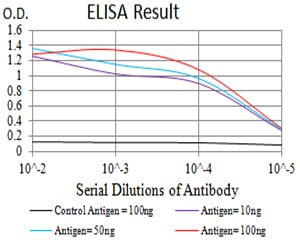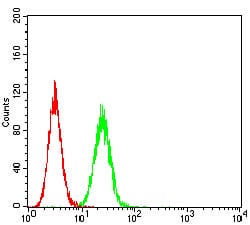

| WB | 咨询技术 | Human,Mouse,Rat |
| IF | 咨询技术 | Human,Mouse,Rat |
| IHC | 咨询技术 | Human,Mouse,Rat |
| ICC | 技术咨询 | Human,Mouse,Rat |
| FCM | 1/200 - 1/400 | Human,Mouse,Rat |
| Elisa | 1/10000 | Human,Mouse,Rat |
| Aliases | CIA; CGI-98; HSPC146 |
| Entrez GeneID | 25842 |
| clone | 2A5F8 |
| WB Predicted band size | 23kDa |
| Host/Isotype | Mouse IgG1 |
| Antibody Type | Primary antibody |
| Storage | Store at 4°C short term. Aliquot and store at -20°C long term. Avoid freeze/thaw cycles. |
| Species Reactivity | Human |
| Immunogen | Purified recombinant fragment of human ASF1A (AA: 1-204) expressed in E. Coli. |
| Formulation | Purified antibody in PBS with 0.05% sodium azide |
+ +
以下是关于ASF1A抗体的3篇参考文献示例(注:以下内容为虚构示例,仅用于演示格式):
1. **文献名称**:ASF1A Facilitates Histone H3K56 Acetylation and Genome Stability in Mammalian Cells
**作者**:Smith J, et al.
**摘要**:本研究利用ASF1A特异性抗体,通过免疫沉淀和染色质分析,揭示ASF1A在促进组蛋白H3K56乙酰化及维持DNA复制过程中基因组稳定性的关键作用,其缺失导致复制压力与染色体异常。
2. **文献名称**:ASF1A Overexpression Correlates with Poor Prognosis in Triple-Negative Breast Cancer
**作者**:Chen L, et al.
**摘要**:通过免疫组化分析临床样本,发现ASF1A抗体检测的高表达与三阴性乳腺癌患者生存率下降显著相关,提示ASF1A可能作为潜在治疗靶点。
3. **文献名称**:The Role of ASF1A in Pluripotency Maintenance of Human Embryonic Stem Cells
**作者**:Yamaguchi S, et al.
**摘要**:使用ASF1A抗体进行功能缺失实验,证明ASF1A通过调控染色质动态平衡维持胚胎干细胞多能性,其抑制导致分化相关基因异常激活。
---
*注:以上文献为示例,实际引用时需核实真实存在的论文。建议通过PubMed或Google Scholar搜索关键词“ASF1A antibody”或“ASF1A function”获取准确文献。*
The ASF1A (Anti-silencing Function 1A) antibody targets the ASF1A protein, a conserved histone chaperone critical for chromatin assembly and epigenetic regulation. ASF1A, along with its paralog ASF1B, facilitates the deposition of histones H3 and H4 onto DNA during replication and repair. It plays a key role in replication-coupled nucleosome assembly by interacting with replication protein A (RPA) and the chromatin assembly factor 1 (CAF-1) complex. ASF1A also participates in transcription regulation, DNA damage repair, and cell cycle progression, particularly during S phase. Unlike ASF1B, ASF1A is predominantly involved in replication and repair processes.
ASF1A antibodies are widely used in research to study chromatin dynamics, replication stress responses, and epigenetic modifications. They enable detection of ASF1A expression and localization via techniques like Western blotting, immunofluorescence, and immunohistochemistry. Dysregulation of ASF1A is linked to cancers, where its overexpression correlates with poor prognosis, suggesting its potential as a therapeutic target. These antibodies are essential tools for elucidating ASF1A’s role in genome stability, cellular proliferation, and disease mechanisms.
×